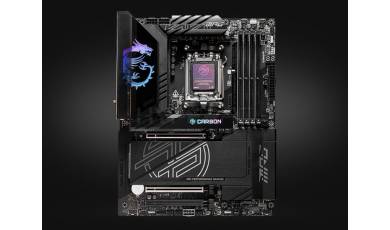Flash firmware on Lava Z41
Mobiles >> Lava >> Lava Z41| Specifications | Reviews | Secret codes |
| Unlock phone | Root phone |
| Backup | Flash Firmware | Screenshot |
| Hard Reset |
How to flash Lava Z41?
Why reinstall the firmware?
Errors start to appear in the operating system.
Some applications stop opening.
Some programs from the Play Market do not start.
The phone restarts or shuts down for no reason.
The phone began to slow down a lot.
The OS does not match the system requirements of the smartphone.
Where can I find the firmware?
On the official website of the manufacturer.
On sites where third-party developers and phone manufacturers post custom or official OS.
What should be done before installing the firmware?
Create a backup copy of user data and transfer it to another medium.
Insert an SD card into your phone to write the firmware to it.
Find information about your smartphone model.
Fully charge your device's battery.
Find and download the archive with Firmware. Place it on the SD card.
Installing TWRP Recovery
Download the Official TWRP App from the Play Market. Download, install and launch the application..
When you start the application for the first time, you need to give consent to future manipulations, as well as to give consent to granting the application Superuser rights and click the 'OK' button.
In the next screen, select the item 'TWRP FLASH' and provide the application with root-rights.
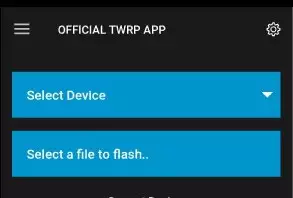
On the main screen of the application, select 'Select Device', and find your phone model.
After selecting the phone, the application will redirect the user to a web page to download the modified recovery environment image file. Download the proposed *.img file.
After downloading the image file, go to the main screen of the Official TWRP App and press the 'Select a file to flash' button. Then we tell the program the path where the file loaded in the previous step is located.
Press the 'FLASH TO RECOVERY' button and confirm that you are ready to start the procedure - press 'OK' in the question window.
When the message 'Flash Completed Succsessfuly!' appears. Click 'OK'. The TWRP installation procedure can be considered complete.
Copy the firmware and other necessary files to the SD card.
Insert a memory card into the device.
To reboot into recovery, you need to use a special item in the Official TWRP App menu, accessible by pressing the button with three stripes in the upper left corner of the main screen of the application. We open the menu, select the 'Reboot' item, and then click on the 'REBOOT RECOVERY' button. The phone will reboot into the recovery environment automatically.
Firmware via TWRP
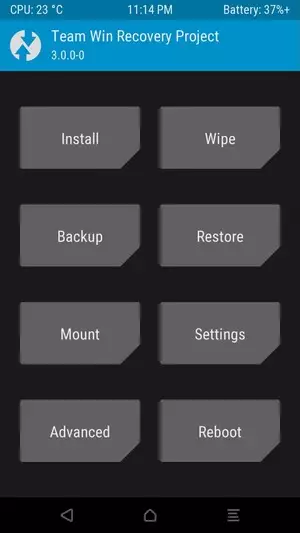
Before flashing, you need to clear the 'Cache' and 'Data' sections, press 'WIPE' on the main screen. You will delete all user data from the phone, this will avoid software errors and other problems.
Now you can start flashing. Click the 'Install' button.
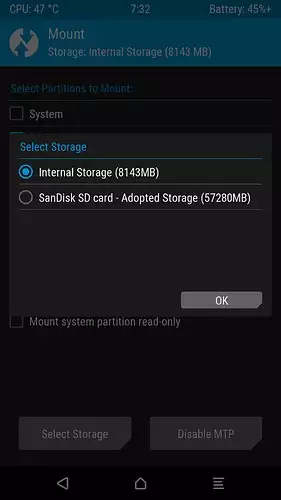
The file selection screen is displayed. At the very top is the 'Storage' button, select the location where the firmware file is located.
Select the location where the files were copied. Press the OK button.
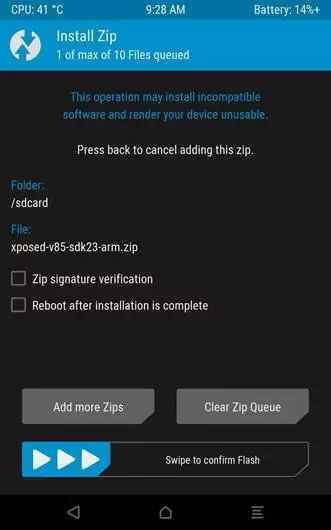
Find the file we need and click on it. A screen opens with a warning about possible negative consequences, as well as the item 'Zip signature verification'. This item should be checked by placing a cross in the check-box, which will avoid using damaged files when writing to the phone's memory sections.
The procedure for writing files to the phone's memory will begin, this is accompanied by the appearance of inscriptions in the log field and the movement of the progress bar.
The completion of the firmware installation procedure is indicated by the inscription 'Successful'.
Summary: Operating System: Android 9.0 (Pie); CPU: 4 x 1.4GHz Cortex A7; Chipset: Unisoc SC9832E; Architecture: 64-bit; GPU: Mali-T820 MP1; Custom UI: Android Go; RAM: 1 GB; Screen Size: 5.0 inches (12.7 cm); Resolution: 480 x 854 pixels; Type: TFT; Screen To Body Ratio: 65.42 %; Pixel Density: 196ppi; Aspect Ratio: 16:9; Internal Storage: 16 GB; Card Slot: Yes, Up to 128 GB; Number of Cameras: Single; Resolution: 5 MP (Digital Zoom) camera; Flash: LED Flash; Features: Digital Zoom, Auto Flash; Video: 1280x720fps; Number of Cameras: Single; Resolution: 2 MP camera; 3.5 mm Jack: Yes; FM Radio: Yes; Loudspeaker: Yes; SIM 1 Bands: 4G Bands: TD-LTE 2300(band 40) / 2500(band 41) FD-LTE 2100(band 1) / 180 ...
Comments, questions and answers on the flash firmware Lava Z41
Ask a question about Lava Z41



